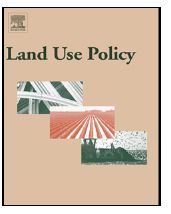Using social data in strategic environmental assessment to conservebiodiversity
tStrategic Environmental Assessment (SEA) is increasingly used to assess land use plans in a way that isbroader in spatial, temporal and conceptual scope than traditional Environmental Impact Assessment(EIA). Meanwhile, conservation scientists have recognised that successful biodiversity conservation out-comes rely on information about both biological priorities and the feasibility of undertaking conservationactions. SEA provides a framework for integrating information on the social determinants of conservationfeasibility with supporting environmental legislation in order to achieve enhanced conservation out-comes. In this paper we argue that data on the social context of land use plans are vital to ensure effectivebiodiversity conservation outcomes that result from SEAs. We explore the Australian Environment Pro-tection and Biodiversity Conservation Act (1999) (EPBC Act) as a case example of how the integration ofthese data can be practically achieved within an existing legal process. While a range of social data isrelevant to this type of assessment, we focus on the use of spatially-referenced social data in the contextof land use planning. When applied to the design and implementation of land use plans, this type ofinformation can improve the acceptability of conservation actions, enhance environmental stewardship,and minimise land use conflict through taking stock of the values and attitudes (precursors to behaviour)that are relevant to proposed land use change and conservation action. Through exploring the integra-tion of these data into each of the stages of SEA under the EPBC Act, we show that opportunities exist tostrengthen the effectiveness of SEA in delivering conservation outcomes without altering existing legalprocesses. Yet, for this to be done effectively, practitioners need to be cognisant of a range of theoreticaland methodological challenges related to the generation and interpretation of these data, as well as thesocio-political context in which they are applied.
Publisher: Land Use Policy
Region: Australia
Type: Research Paper

